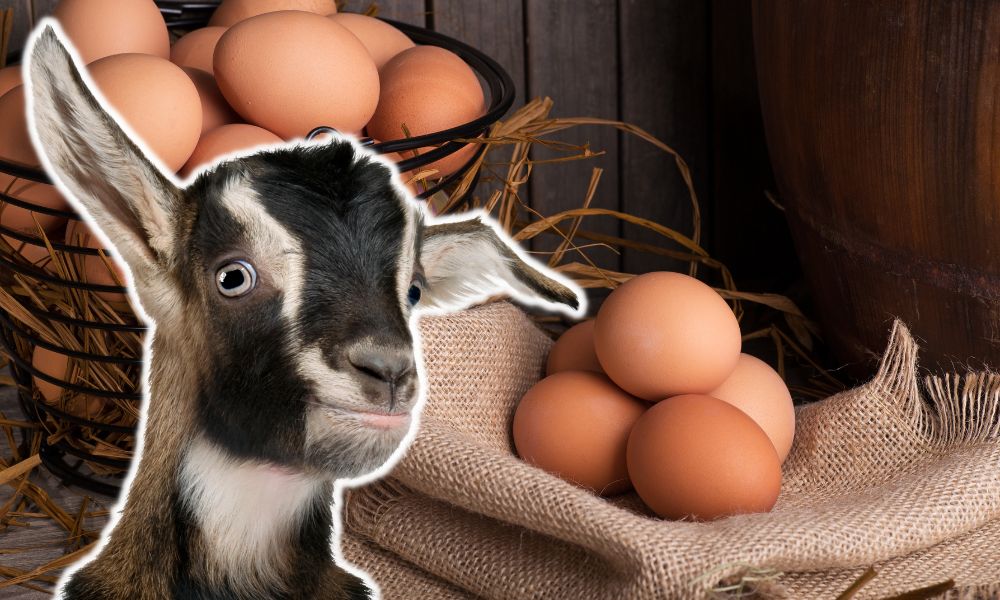This will likely not come as a shock to most of us.
Egg-laying is generally the arena of reptiles, amphibians, insects and birds.
The vast majority of mammals do not lay eggs, and goats are no different.
That said, there are some interesting facts surrounding this question that are worth looking into.

Do female goats lay eggs?
No, they don’t.
Female goats give birth in the same way most mammals do.
They are impregnated by a male, and then go through a fairly lengthy gestation period.
They are generally pregnant for around 4-5 months, mating at roughly the beginning of winter and giving birth in the early spring.
At no point does a female goat lay an egg in aid of giving birth.
This is very rarely the arena of mammals.
A goat is, in many ways, simply too complex a creature to grow in an egg.
A goat needs the nutrients that its mother ingests during pregnancy to properly develop and survive.
Goats are categorized specifically as placental mammals.
This means they carry their babies in their womb and give birth to them live and ready to start living their life.
Placental refers to the special fluid and membrane in which the baby develops.
There is something akin to this in an egg—a special membrane which provides nutrients and helps the infant develop.
But goats simply do not operate in this way!
Do male goats lay eggs?
It will probably come as no surprise to you to learn that male goats, also, do not lay eggs.
Male goats are not the ones who bear the children, so they do not even gestate fetuses—they merely impregnate the female.
One area where you could be forgiven for getting confused is the moment of mating and conception.
Here, the female does have an ‘egg’ which must be fertilized by the male’s sperm in order to kickstart pregnancy.
The male has sperm, and the female has eggs—just like in human sexual anatomy.
Neither of them is able to actually lay an egg.
This is not the same kind of egg—it is essentially a microscopic cell, totally imperceptible to the naked eye.
Why do goats not lay eggs?
It’s a simple question of evolution.
As you can see by merely looking at the evolutionary tree, the dominating creatures in the distant past did used to almost exclusively lay eggs—the dinosaurs, of course, but also any period in prehistory in which the earth was ruled by reptiles and amphibians.
However, after the asteroid impact which wiped out the dinosaurs around 65 million years ago, mammals took over.
Across the entire planet, no animal larger than a chicken walked away from that impact.
Up until that time, mammals had existed mainly as egg-thieves, surviving by stealing the eggs of larger creatures.
This meant that eggs were actually a rather hazardous and risky way of rearing infants.
When the dinosaurs were gone, mammals took over.
These mammals did not lay eggs, and so the animals that we see today, by and large, do not lay eggs.
Goats are part of this—they have been enormously successful over time, and not just with our help.
Goats give birth to live, developed young, which can they immediately suckle on their parent’s milk.
This gives the infant a much higher chance of survival as opposed to needing to hunt for food for them.
But which mammals do lay eggs?
What are the mammals that lay eggs?
There are two groups of mammals which lay eggs.
The first, and most well-known, is the duck-billed platypus.
This is a mammal, as it has fur covering its body and it feeds its newly born young from milk glands.
However, those young do develop in eggs, rather than being given a live birth.
The other is various kinds of echidna, which are very similar to the platypus.
These are the short-beaked echidna, the eastern and western long-beaked echidnas and Sir David’s long-beaked echidna.
These mammals are very unusual in this sense—as you can see, there are only five total species of mammal that lay eggs.
They are evolutionary hangovers from a distant past.
However you look at it, then, goats do not lay eggs in any form.
It’s exceedingly rare that mammals should ever lay eggs, and the only examples are of creatures that are far smaller than goats.
I’m not sure what a goat egg would look like, and I’m not sure I want to know!
Goats are classic mammals who give birth to live young, and suckle them on their udders.
Goats do not lay eggs.
